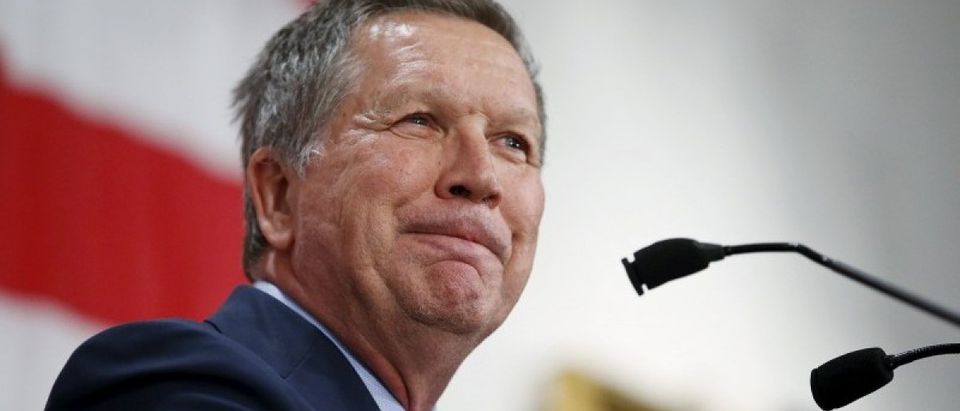After Marco Rubio suspended his campaign this was obviously now a two-man race. And so a Wall Street Journal editorial on March 16 that encouraged John Kasich not to quit seemed bizarre. What voters now wanted — and needed — was a straightforward choice between Trump and Cruz, without the distortion of the now irrelevant Kasich. How many times did primary voters have to say that they didn’t want Kasich? He may poll well against Hillary, but that’s because he sounds like a Democrat much of the time, and so loses Republican primaries.
But when the Journal gave its reasons, things only got worse: it wanted a Kasich/Rubio ticket. Cruz and Trump delegates would make up at least three quarters of the convention, and it was beyond foolish to imagine that this overwhelmingly anti-establishment and anti-amnesty convention could nominate an establishment pro-amnesty ticket.
The editorial also insisted Kasich and Rubio could unite the party, but that was nothing short of delusional. If the party establishment managed to engineer that nomination and ignore the avalanche of votes cast for the exact opposite, the result would be an explosion.
So why urge Kasich to stay in when he has no chance? Evidently insecure about this, the Journal ran an essay by Kimberley Strassel two days later that tried to provide a rationale. Strassel suggested that Kasich must challenge the familiar assumption that “winning” is coming out on top in states and “winning” is earning lots of delegates. She is, alas, not very good at explaining how this would work. Scare quotes can only do so much. How could her editor allow Ms. Strassel to embarrass herself?
It’s time we asked: what is going on when a great newspaper starts to drivel incoherently? The answer lies in its fierce devotion to amnesty. For the Journal, there are no serious or respectable arguments on the other side. If you oppose amnesty for illegals, you are a nativist, opposed to both immigration and to immigrants themselves.
You may think that you are only against illegal immigration. And you may imagine that you think this because picking and choosing which laws to obey endangers the rule of law, and because a country ought to be in control of its immigration policies and not cede control of them to people who break the law to enter it without being vetted for health or criminality. But the Journal’s editorial writers will have none of this. They know these are just excuses for your anti-immigrant bigotry.
This is a familiar tactic. When conservatives argue for tax reductions, liberals are apt to say: spare us your rationalizations about spurring the economy, we know you are just greedy. But the trouble with investing much moral capital in complex political arguments that are often decided by empirical fact is that it becomes hard to climb down and admit you were wrong when facts go against you. The dangers of uncontrolled immigration are becoming apparent everywhere and Republicans are voting overwhelmingly for two candidates who promise to stop it. The Journal’s response is typical of moral smugness confronted by evidence of the damage it has done: absolute fury.
The Journal directs its hostility at amnesty’s most articulate critic: Ted Cruz. The constant sniping at Cruz, often for the silliest reasons, betrays an irrational animus against him. As Cruz’s polling numbers began to surge in Wisconsin the Journal huffed: “he shouldn’t overestimate his appeal…. millions are doing it while holding their nose.” This unprofessional, gratuitously spiteful comment affords us a glimpse into the dark mental world of an editor whose moral certainty has been trampled by the huge anti-amnesty vote of these primaries. Of course he can’t know what those millions think.
Only this mind-set explains the Journal’s nonsensical utterances about Kasich. Most people see uniting behind Cruz as the only way to avert a Trump nomination, but the Journal can’t bear to do anything that might facilitate Cruz. The editor stews in his cauldron of resentment, divorced from reality, and intoxicated by his pipe dream that Kasich could make Cruz go away.
The Journal tried to label Cruz an opportunist, but that didn’t work too well when he courageously opposed the ethanol mandate in Iowa while others pandered. But the most telling instance of the Journal’s animus against Cruz was its repeating the same silly jibe over and over again until it became a nervous tic of the editor’s. The March 24 editorial, for example, asserts “Mr. Cruz has spent two years telling mainstream Republicans that he doesn’t need or want their votes.” This is a foolish caricature of Cruz’s point about faithfulness to conservative principle, one made by many Republicans over the years. Of course Cruz is asking for mainstream Republican votes. But it’s the repetition that’s so revealing: exactly the same jibe is also made in the March 14 and March 16 editorials. The editorial writer’s resentment is simply out of control: Queeg-like, he can’t stop repeating himself.
The Journal’s editorial page editor is so consumed by his loathing of Cruz that he is willing to risk a catastrophe to avoid the hated possibility of a Cruz nomination. His Kasich pipe dream is a costly fantasy.
John M. Ellis is a Professor Emeritus at the University of California, Santa Cruz, and Chairman of the California Association of Scholars


